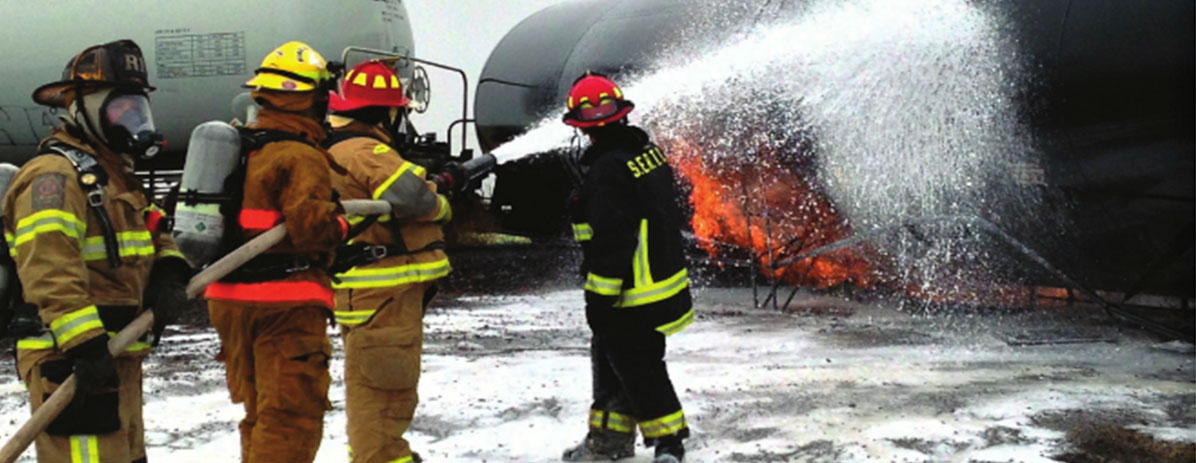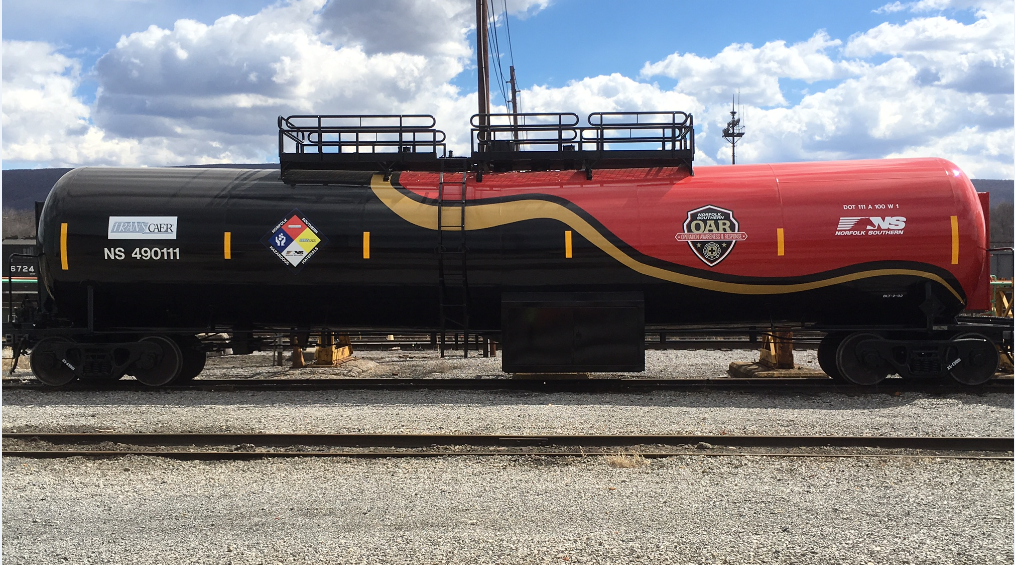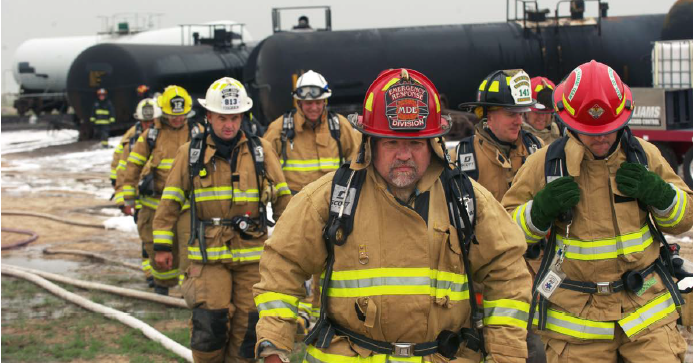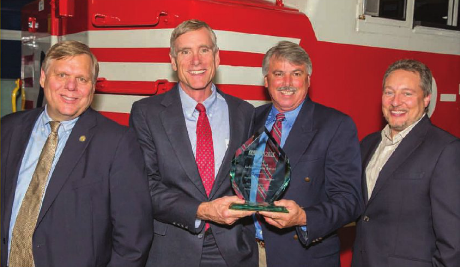

The Norfolk Southern team provides a menu of emergency response training options. If you are an emergency responder (including: fire department, law enforcement, emergency medical services, hazmat response team, emergency management personnel, military, homeland security personnel, shippers, and customers) and are interested in training, please contact us at [email protected] to provide you options in your community. Please review our training options below. All of the training options provided by Norfolk Southern are free to attendees.

In 2015, Norfolk Southern teamed with industry partner DuPont on 25 multiday training sessions using a DuPont training tank car. The tank car, moved to training locations by Norfolk Southern, offered emergency responders hands-on training with the type of car the industry uses to transport hazardous material, including lessons on tank car safety features.
In April 2016 NS will put a new safety train in service with a dedicated locomotive, 2 box car classrooms, 4 tank cars, and 2 specially equipped flat cars to provide hands-on training.
The training sessions include the following topics:
2016 NS HazMat Safety Train Dates |
|
|---|---|
| May 11-13 | Harrisburg, PA |
| May 24-26 | Baltimore, MD |
| June 14-16 | North Jersey - TBD |
| June 21-23 | Buffalo, NY |
| June 28-30 | Chicago, IL |
| July 12-14 | Toledo, OH |
| July 19-21 | Ft. Wayne, IN |
| August 2-4 | Cincinnati, OH |
| August 10-12 | Knoxville, TN |
| August 23-25 | Linwood, NC |
| August 30 - September 1 | Alexandria, VA |
| September 13-15 | Norfolk, VA |
| September 27-29 | Greenville, SC |
| October 11-13 | Atlanta, GA |
| October 25-27 | Chattanooga, TN |
| November 8-10 | Slidell, LA |
| November 12-13 | Columbia, SC (South Eastern HazMat School) |
| November 15-16 | Columbia, SC (GCCI Class) |
| April 20 | Sheffield, AL | Table-Top |
| May 12 | Albemarle County, VA | Table-Top |
| June 11 | King of Prussia, PA | Full-Scale Exercise |
| August 12 | Cambria County, PA | Table-Top |
| TBD | Bluefield, WV | Table-Top |
| TBD | Crewe, VA | Table-Top |
| TBD | Lehigh County, PA | Table-Top |
| TBD | Rome, GA | Table-Top |
| TBD | Schenectady County, NY | Table-Top |
To register on-line for training go to:
www.transcaer.com/events.aspx
Each year Norfolk Southern sponsors an Advance Tank Car Emergency Response Course at the Association of American Railroad’s Security and Emergency Response Training Center (SERTC) in Pueblo, Co.
For more info on the training opportunities available at SERTC click the following link:

As part of a voluntary industry initiative, Norfolk Southern is helping to train local emergency responders in how to safely respond to potential incidents involving trains moving crude oil.
Norfolk Southern and other large railroads are sponsoring classroom and hands-on training at the Association of American Railroad’s Security and Emergency Response Training Center (SERTC) in Pueblo, Co. The railroads in early 2014 committed $5 million to the initiative, including developing a three-day training course and paying for
1,500 first responders to attend.
In 2014, Norfolk Southern invested $126,000 to enhance training at the AAR’s training center. The company also provided $378,000 to cover the costs of travel and training for 126 first responders from 11 states, primarily along the company’s crude oil transport corridors. Those participants included fire chiefs, paramedics, homeland security officials, hazardous materials officers, and others from Pennsylvania, Ohio, Delaware, Illinois, Indiana, New York, New Jersey, Virginia, Maryland, Alabama, and Kentucky.
Employees in Norfolk Southern’s hazardous materials and environmental operations assisted with training. Attendees learned about the different types of crude oil moved by rail; basic site and damage assessment at a derailment; tank car design and construction; planning for crude oil incidents; and working with the railroad. A simulated derailment of 20 tanker cars offered hands-on training.
In 2015, Norfolk Southern sponsored training for 80 additional emergency responders and has committed to provide training for 40 more emergency responders in May 2016.
Free Web-Based Crude by Rail Training for Emergency Responders. The Association of American Railroads, in cooperation with the seven major railroads, BNSF, CN, CP, CSX, KCS, NS, and UP are now offering, at no charge to emergency responders, Crude by Rail Web Based Training.
This program, developed by TTCI-SERTC, is designed for and gives the emergency responder the basic knowledge to respond to incidents involving CBR. The web-based training is designed for your convenience. You decide when and where to start your training. Instructors teach this program in a format that is easy for you to understand, and it gives you the foundational information needed to make basic protective decisions in the event an incident happens in your jurisdiction
Just click http://www.aar.com/CBR.html to get free access to the program
This eight-hour awareness-level course is designed to increase the knowledge of first responders in recognizing and characterizing the different types of rail cars, potential leaks, and courses of action to be taken based on initial site assessment. The course will increase participants' knowledge of safety and hazardous conditions that may exist at the scene, and will allow them to become familiar with safe practices adopted by the railroad industry. This course has been developed by The University of Findlay and is delivered in an instructor-led format.
https://www.ruraltraining.org/training/courses/awr-147/
This Federal Railroad Administration (FRA) video describes rescue operations for train crews from locomotives involved in crashes or derailments. Includes information regarding approaching the site of a locomotive emergency, entering the locomotive, and flagging oncoming trains, as well as a listing of railroad emergency contact and local FRA Regional Office telephone numbers.
The Transportation Rail Incident Preparedness and Response, Flammable Liquid Unit Trains resource materials were developed to provide critical information on best practices related to rail incidents involving hazard class 3 flammable liquids, such as crude oil and ethanol. A key component of this initiative is to learn from past experiences and to leverage the expertise of public safety agencies, rail carriers, and industry subject matter experts in order to prepare first responders to safely manage incidents involving flammable liquid unit trains.
These training resources offer a flexible approach to training the first responders and emergency services personnel in pre-incident planning and response. Each module contains a PowerPoint presentation, Student Workbook, and Instructor Lesson Plan. In addition to these materials, there are three interactive scenarios with animation and introduction videos to help instructors lead tabletop discussions. Click on the link below to download the TRIPR materials.
The Association of American Railroads (AAR) and the American Petroleum Institute (API) and the member companies of both organizations have worked to create a safety awareness course for first responders. The course is meant to provide some of the information first responders need to know before approaching an incident involving crude oil moved by rail. While crude oil is a flammable liquid and should be treated as such during a response, the growth in crude oil by rail has raised concerns about how first responders can be better prepared if an incident occurs. This program seeks to assist in preparation by describing the characteristics of crude oil and the rail cars it is shipped in, the RECEOS strategies that should be considered if crude oil is present, spill response and firefighting considerations, and the need for structured incident management. This course has been designed for first responders with basic fighting training and is offered free of charge.
There are many resources available for chlorine emergency response training. Presentation topics include: chlorine properties and emergency response; chlorine tank cars and rail safety; and the proper use of Emergency Kits A, B and C to mitigate leaks from chlorine cylinders, ton containers and tank car valves.
Click here learn about the Chlorine Safety Training Tour.
With Anhydrous Ammonia being a large part of American agricultural, manufacturing, commercial, and transportation industries and incidents occurring in the past across the United States, there is a possibility that at some point a large ammonia incident may occur. TRANSCAER® has created a high-quality training program that will help prevent and or mitigate such an incident for emergency responders in communities where anhydrous ammonia is manufactured, stored, shipped, transported, or used in high volume quantities. All the materials were developed by our team of seasoned experts from across various industries.
Click here to learn about the Anhydrous Ammonia Safety Training Tour.
To enhance the knowledge, capability and readiness of operational emergency response agencies to effectively respond to fires, spills and other emergencies involving ethanol and ethanol blended fuels, the Ethanol Emergency Response Coalition has developed educational materials, training programs and other products for emergency responders that will improve their knowledge of and ability to respond to emergencies involving ethanol and ethanol blended fuels, and allow them to make informed decisions regarding capability based on community risk and other factors.
Click here to learn about the Ethanol Emergency Response Coalition resources.
The Security and Emergency Response Training Center (SERTC) in partnership with the Center for Rural Development (CRD) have released “Introduction to Flammable Liquids Training”. This is a Web Based Training program that is available at no charge to emergency responders. This Web Based Training program is designed to assist volunteer and rural emergency responders with the understanding of, preparing for, and appropriate response to incidents involving flammable liquids including crude oil, ethanol, and other flammable liquids that travel by rail through their communities. This self-paced program is designed to build a strong foundation for the emergency responder.
The program, developed by SERTC, is designed to be a self-paced program where the participant can start and stop as needed throughout the 4 hour program. A base evaluation starts the program and ends with a final evaluation to allow the participant to gauge what has been learned. Upon successful completion, the participant will receive a certificate of completion.
Click here to participate in the Introduction to Flammable Liquids Training course.
There are over 300,000 miles of transmission lines carrying Liquid Natural Gas (LNG) across the United States, and over 1.8 million miles of local distribution lines. LNG supply and demand are both increasing, and the rate at which it is shipped into the country is also increasing.
The Pipeline and Hazardous Materials Safety Administration (PHMSA) has produced an LNG training video specifically for fire marshals, fire chiefs, government officials and other personnel who may have a part in the planning and response to LNG incidents.
The 30-minute video is very comprehensive, covering:
The video discusses common accidents or incidents one can expect when LNG is involved, and also does a good job at describing the types of major accidents that have not happened but are possible. Rail shipments of LNG are expected to increase in intermodal containers and at some point tank cars if approved by the Federal Railroad Administration.
Norfolk Southern works hard to ensure the safe transportation of hazardous materials by rail. A key part of that effort is voluntary participation in the Transportation Community Awareness and Emergency Response program, known as TRANSCAER®. At TRANSCAER®-related events in 2015, Norfolk Southern employees provided training for more than 4,792 emergency responders in 18 states to help communities across our network prepare for and safely respond to potential incidents involving rail transport of hazardous materials. Local first responders and government officials participated in classroom and hands-on training, table top simulations, and full-scale drills.
From left to right: David Schoendorfer, Paul Williams, Robert Wood, Richard Russell accept the Norfolk Southern National TRANSCAER® Achievement Award at the dedication of the new NS-9-1-1 at Union Station in Washington, DC